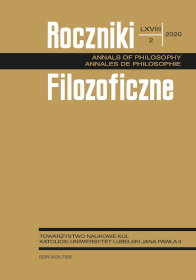Epistemic Functions of Intuition in Descartes
Abstract
The topic of the paper is the notion of intuition in Descartes’ philosophy and its epistemic functions. Descartes introduces his notion of intuition in the context of a description of his method and process of knowing and doing science. Intuition is a significant component of this process. I intend to show that the main epistemic functions of intuition in Descartes’ philosophy are differentiated. Intuition is essential not only in the context of justification (the Cartesian synthetic method of proof) but also and especially in the context of discovery (the Cartesian analytic method of discovery). It plays not only a role in the foundation of the cogito but also on different stages of constructing the system of knowledge. Intuition has important functions in grasping simple natures, forming primary concepts, comprehending complex natures, forming primary propositions (including primary principles), and capturing relationships between them and building deductive reasoning (the role of intuition in deduction). Hence, intuition is the foundation for all primary stages of producing knowledge. It is active and important element of pure thinking (a priori) in human knowledge, and science. It fulfils these functions due to its specific epistemic properties. I also argue that intuition is not an autonomous and complete type of knowledge. Nor is it an intuitive thesis, but rather the basis of a justification for theses (including the cogito).
References
Alanen, Lilli. 2008. “Omnipotence, Modality, and Conceivability.” In A Companion to Descartes, edited by Janet Broughton and John Carriero, 353–71. Malden, MA: Blackwell Publishing.
Beck, L. J. 1952. The Method of Descartes. A Study of the Regulae. Oxford: Oxford University Press.
Broughton, Janet, and John Carriero, eds. 2008. A Companion to Descartes. Malden, MA: Blackwell Publishing.
Descartes, René. Oeuvres de Descartes. Edited by Charles Adam and Paul Tannery. 12 vols. Paris: Vrin/CNRS, 1964–76.
Descartes, René. Discourse on the Method. In The Philosophical Writings of Descartes, edited by John Cottingham, Robert Stoothoff, and Dugald Murdoch, 1:111–51. Cambridge: Cambridge University Press, 1984. 17th printing, 2005. Polish version published as Rozprawa o metodzie. Translated by Wanda Wojciechowska. Warsaw: Państwowe Wydawnictwo Naukowe, 1988.
Descartes, René. Meditations on First Philosophy. In The Philosophical Writings of Descartes, edited by John Cottingham, Robert Stoothoff, and Dugald Murdoch, 2:1–62. Cambridge: Cambridge University Press, 1984. 17th printing, 2005. Polish version published as Medytacje o filozofii pierwszej. Translated by Jan Hartman. Kraków: Aureus, 2002.
Descartes, René. Principles of Philosophy. In The Philosophical Writings of Descartes, edited by John Cottingham, Robert Stoothoff, and Dugald Murdoch, 1:177–292. Cambridge: Cambridge University Press, 1984. 17th printing, 2005.
Descartes, René. Rules for the Direction of the Mind. In The Philosophical Writings of Descartes, edited by John Cottingham, Robert Stoothoff, and Dugald Murdoch, 1:7–78. Cambridge: Cambridge University Press, 1984. 17th printing, 2005. Polish version published as Reguły kierowania umysłem. Poszukiwanie prawdy poprzez światło naturalne. Translated by Ludwik Chmaj. Kęty: Antyk, 2002.
Judycki, Stanisław. “Doświadczenie i rozum.” Accessed February 23, 2020. https://www.kul.pl/files/57/wydzial/judycki/Judycki_2009a.pdf.
McMullin, Ernan. 2008. “Explanation as Confirmation in Descartes’s Natural Philosophy.” In A Companion to Descartes, edited by Janet Broughton and John Carriero, 84–102. Malden, MA: Blackwell Publishing.
Morawiec, Edmund. 1965. “O dedukcji u Kartezjusza.” Studia Philosophiae Christianae 1 (1): 175–97. Morawiec, Edmund. 1967. “O intuicji intelektualnej u Kartezjusza.” Studia Philosophiae Christianae 3 (2): 195–213.
Miles, Murray. 2008. “Descartes’s Method.” In A Companion to Descartes, edited by Janet Broughton and John Carriero, 145–63. Malden, MA: Blackwell Publishing.
Mursell, James L. 1919. “The Function of Intuition in Descartes’ Philosophy of Science.” The Philosophical Review 28 (4): 391–409.
Newman, Lex. 2019. “Descartes’ Epistemology.” In The Stanford Encyclopedia of Philosophy (Spring 2019 Edition), edited by Edward N. Zalta. Accessed February 7, 2020. https://plato.stanford.edu/archives/spr2019/entries/descartes-epistemology.
Patterson, Sarah. 2008. “Clear and Distinct Perception.” In A Companion to Descartes, edited by Janet Broughton and John Carriero, 216–34. Malden, MA: Blackwell Publishing.
Rorty, Richard. “Intuition.” In The Encyclopedia of Philosophy, edited by Paul Edwards, 4:204–12. New York–London: Macmillan, Free Press, 1967. 2nd ed. (2005): 722–32.
Walczak, Monika. 2016. “Intuition and Insight. The Analysis of Their Selected Features with Reference to Bernard Lonergan Position.” Analiza i Egzystencja, no. 34, 29–44.
Walczak, Monika. 2011. “Intuicja jako typ poznania, wiedzy i dyspozycji.” In Zagadnienia Naukoznawstwa 47 (2): 127–44.
Copyright (c) 2020 Roczniki Filozoficzne

This work is licensed under a Creative Commons Attribution-NonCommercial-NoDerivatives 4.0 International License.





